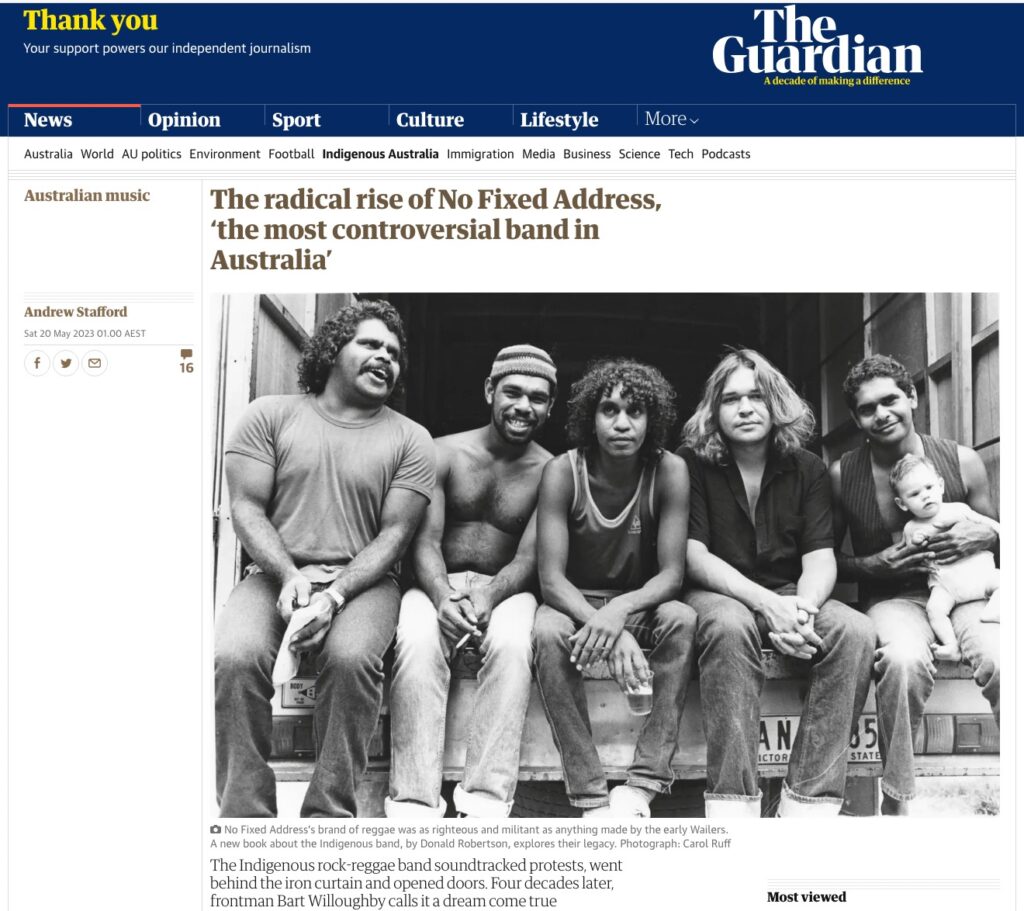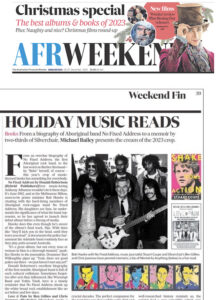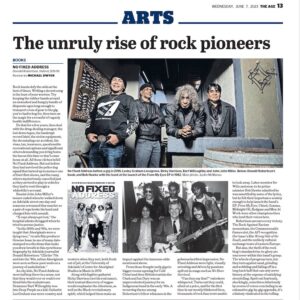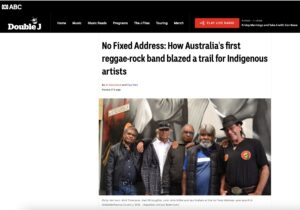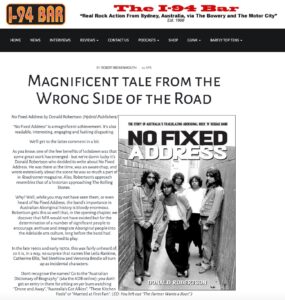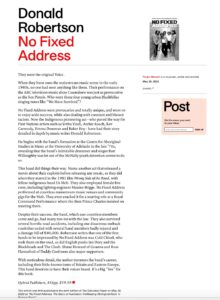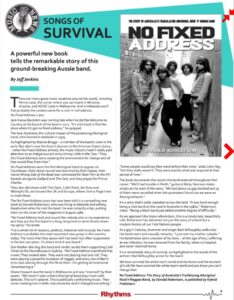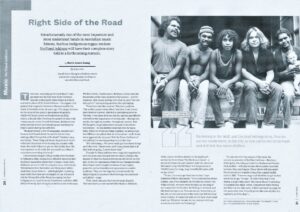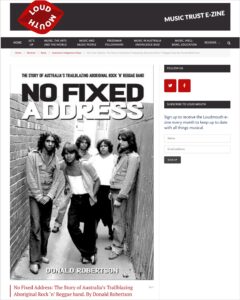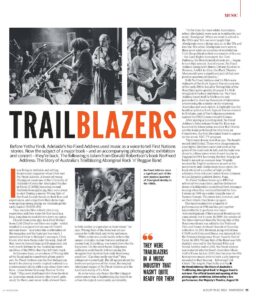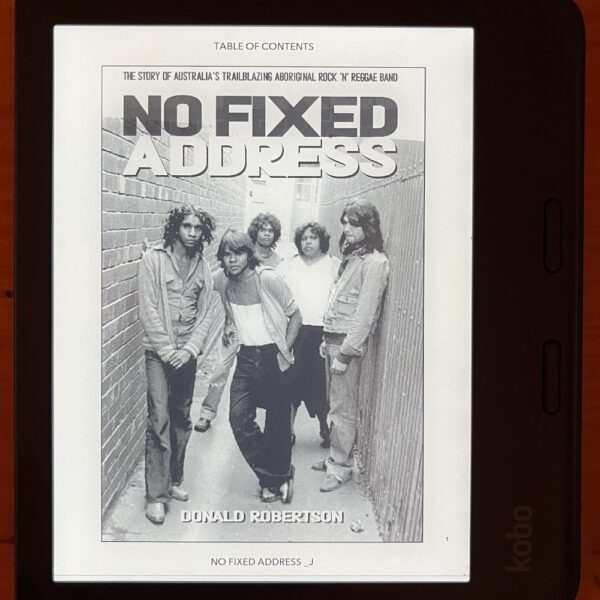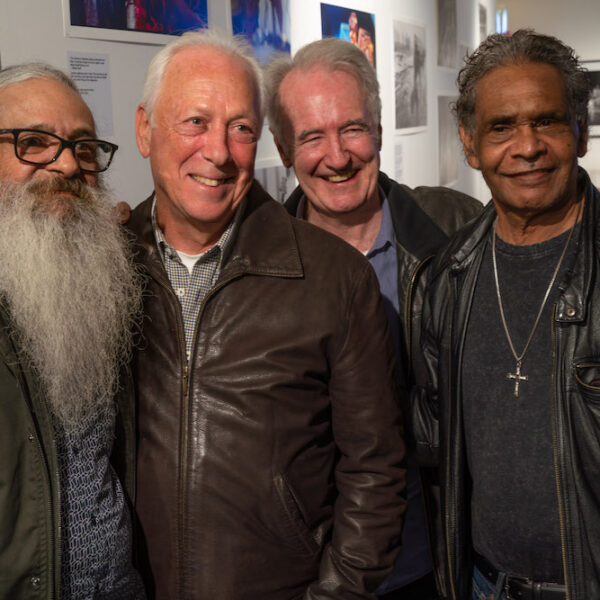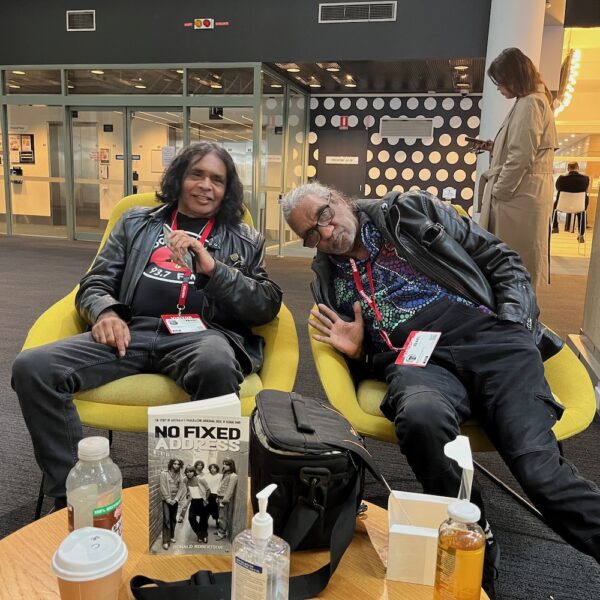‘No Fixed Address’ – reviews and reactions
The critics are swooning over ‘No Fixed Address’. Links to print and online articles and reviews are below.
‘The story of this radical group is told in a new book by Donald Robertson. On the back cover Goanna’s Shane Howard describes No Fixed Address as “the tip of the spear” that plunged into the heart of middle Australia. And as a story, it’s got everything – starting with a fiery truck crash on the Nullarbor Plain when the band were returning from an ill-fated trip to Perth in 1982.’
—Andrew Stafford, The Guardian. Link
‘Even music-loving Anthony Albanese wouldn’t do it these days. It’s June 1982, and at the Melbourne Hilton, soon-to-be prime minister Bob Hawke is chatting with the hard-living members of Aboriginal rock-reggae band No Fixed Address. His daughters are fans, he understands the significance of what the band represents, so he has agreed to launch their debut album before a throng of media. Hawke does this even though he’s aware of the album’s final track, ‘Pigs’, written by rhythm guitarist Ricky Harrison. With lines like “they’ll kick you in the head, until they leave you dead”, it documents the police harassment the Adelaide band routinely face as they play pubs around Australia. “It’s a great album, but not every man or woman in blue is a thorough bastard,” qualifies Hawke to the journalists. Drummer Bart Willoughby pipes up: “Yeah, there are good police out there – we just haven’t met any yet!” Donald Robertson’s excellent biography of the first notable Aboriginal band is full of such cultural collisions. Sometimes forgotten after acts they influenced, like Warumpi Band and Yothu Yindi, here is a timely reminder that No Fixed Address, with their strident civil rights lyrics and Bob Marley-influenced rhythms, shook up the white bread rock establishment like no act before and few since.’
—Michael, Bailey, Australian Financial Review. Link
‘”In the 1950s and ’60s, we were taught that Aboriginals were a dying race,” recalls film producer Graeme Isaac in one of many date-stamped recollections that make you draw breath in this eyewitness biography by Adelaide journalist Donald Robertson. “[I]n the ’70s and into the ’80s, urban Aboriginals were seen as these poor souls on a journey of assimilation.” As city kids, No Fixed Address were halfway there in a sense, not that they would ever or could ever blend into the mainstream. Their mutual discovery of reggae would emphasise the otherness, as well as Black revolutionary spirit, that helped them make an impact against immense odds. Spelt out fearlessly, shockingly, sometimes hilariously by scores of voices concluding in an exhaustive gig-by-gig appendix, it’s a history vindicated in the telling.’
—Michael Dwyer, The Age. Link
‘In 1982, the burgeoning Labor leader and future Australian Prime Minister Bob Hawke accepted the invitation to launch No Fixed Address’ debut mini-album From My Eyes at the Hilton Hotel in Melbourne.
“He was going on there, talking real nice about the album until it got to ‘Pigs’,” says Ricky Harrison. “He turned around – I think he [was looking] at me – and said, ‘That’s not to say that every man and woman in a blue uniform is a thorough bastard’,” Harrison says. “It was like, yikes!”
At the launch, Bart Willoughby was quick to seize on the moment, reportedly offering a snappy retort to Hawke. “Yeah, there are good police out there. We just haven’t met any yet.”
It’s one of many gripping yarns that features in a new book on No Fixed Address, written by one of the band’s earliest champions, Donald Robertson. He first encountered the group in the early ’80s as the editor of Adelaide-based music publication Roadrunner, and tells Double J:
“I felt that the band’s role in breaking open the Australian music scene for Indigenous artists had not really been acknowledged, not really recognised. Artists like Warumpi Band, Yothu Yindi, Archie Roach, were generally seen as the pioneers of Aboriginal rock. I felt it was a story that should be told… The more I spoke to [the band] and more I heard the stories of the ups and downs of their career, the more I thought it was a great yarn as well as an important story.”‘
—Al Newstead and Caz Tran, ABC Radio Double J. Link
‘No Fixed Address’ is a magnificent achievement. It’s also readable, interesting, engaging and fucking disgusting. As you know, one of the few benefits of lockdown was that some great work has emerged – but we’re damn lucky it’s Donald Robertson who decided to write about No Fixed Address. He was there at the time, was an aware chap, and wrote extensively about the scene he was so much a part of in Roadrunner magazine. Also, Robertson’s approach resembles that of a historian approaching The Rolling Stones. The further in I delve, the more hooked I am. Here’s Adelaide, a place I grew up in, with all these familiar names and places and … there’s an entire strata of society that I must’ve known existed, but didn’t know anything about. There’s a lot I don’t know about Aboriginal history, and I won’t excuse my ignorance because I can’t. Reading Robertson’s book is like unpeeling an enormous walnut, the more you discover, the more you realise how very much more there is to discover.’
—Robert Brokenmouth, I-94 Bar. Link
‘They were the original Voice. No Fixed Address were provocative and totally unique and went on to enjoy wide success, while also dealing with constant and blatant racism. Now the Indigenous pioneering act – who paved the way for First Nations artists such as Yothu Yindi, Archie Roach, Kev Carmody, Emma Donovan and Baker Boy – have had their story detailed in depth by music writer Donald Robertson. With meticulous detail, the author traverses the band’s career, inlcuding their little known tours of Britain and Eastern Europe. This band deserves to have their voices heard. It’a a big “Yes” from me.’
—Paulie Stewart, The Saturday Paper. Link
‘No Fixed Address were the first Aboriginal band to appear on Countdown, their debut album was launched by Bob Hawke, their movie Wrong Side of the Road was nominated for best film at the AFI Awards and they played for [then] Prince Charles. They also did shows with The Clash, Cold Chisel, Ian Dury and Midnight Oil. The No Fixed Address story has now been told in a compelling new book by Donald Robertson. As we approach the Voice referendum, this is a timely tale, beautifully told. Robertson has delivered not just the story of a band but a modern history of our First Nations people.’
—Jeff Jenkins, Rhythms.
‘Though No Fixed Address were originally together for only six years and released just two studio albums, the impact of what the band achieved can still be felt to this day. As the first Indigenous band to to tour internationally, their blazed trail brought the issues of land rights, genocide, police brutality and oppression to a wider audience. They set the stage for current bands like King Stingray to represent their heritage on a national – and international – stage.’
—David James Young, The Big Issue.
‘Donald Robertson’s book No Fixed Address deserves to be widely read—as well as being an important record of the band and its place in Australia’s music history, it is an eye-opening view of the many problems faced by Indigenous Australians. Their hair-raising adventures on tour, especially the international tours, make gripping reading but are also confronting, as is the knowledge that racism and other issues are still with us today. As Harrison said in 2020 at the time of the City of Adelaide’s renaming of the laneway: ‘Australia has a long way to go in terms of recognising First Nations people and providing equity, but this means the message and the music of No Fixed Address is still relevant.’
—Elaine Lewis, Loudmouth. Link
‘Before Yothu Yindi, Adelaide’s No Fixed Address used music as a voice to tell First Nations stories. Now the subject of a major book – and an accompanying photographic exhibition and concert – they’re back.’
—SA Weekend, The Advertiser


